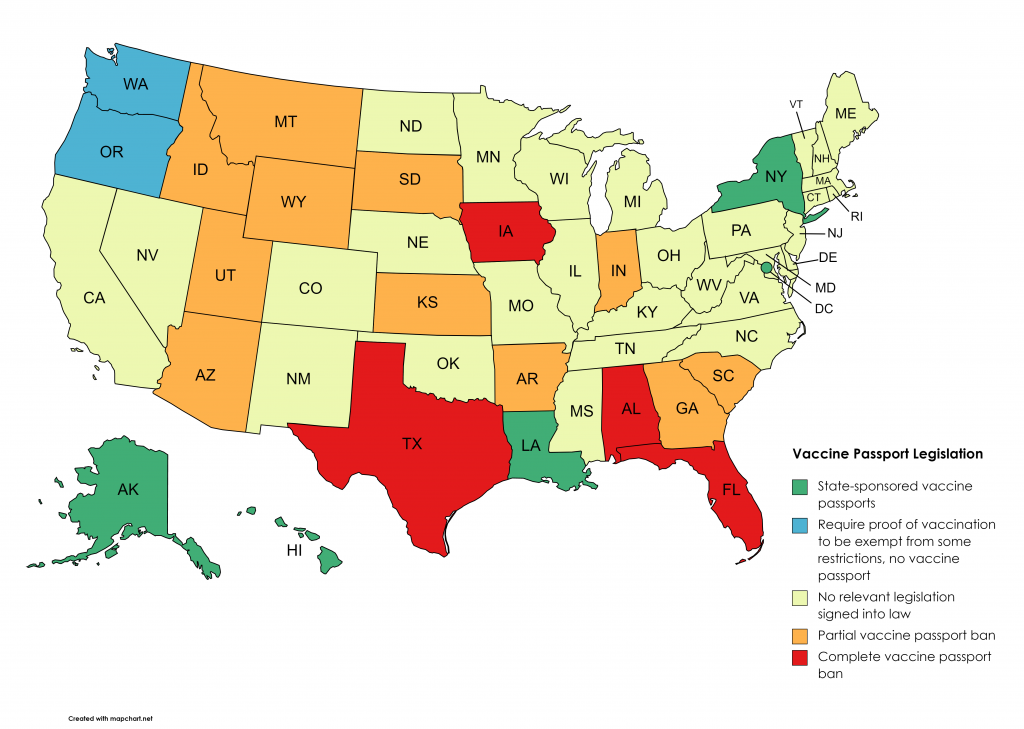
The Biden administration has publicly announced that it does not intend to implement a vaccine passport system nationally. Nevertheless, many states have taken action on their own to either implement vaccine requirements or ban them via vaccine passport legislation or executive action (vaccine passport executive orders). Oregon and Washington allow some exemptions to their at-work social distancing laws if employees can provide proof of insurance. However, neither state has yet implemented a vaccine passport system. States like Virginia and New Jersey are considering implementing a vaccine passport system but have not yet moved forward on the issue.
Meanwhile, states such as Missouri, New Jersey, Pennsylvania, Tennessee, and New Hampshire have bills moving through the legislature to ban or limit the use of vaccine passports. However, there is no guarantee that these measures will pass or be signed into law. The following states have recently passed legislation implementing vaccine passports or banning vaccine passports.
State-Sponsored Vaccine Passports:
Alaska: Optional App
Alaska is preparing to launch an optional app that will allow residents to easily pull up their COVID (and other) vaccination records. The app is called MyIR Mobile, and a pilot program could debut in the next two months, but there is no set timeline for a launch yet. The app will be optional to use, and Alaska Governor Mike Dunleavy issued an executive order in late April stating that the Executive Branch of the Alaska government will not require people to provide proof of vaccination to travel to, from, or within the state.
Hawaii: Safe Travels
Hawaii has a vaccine passport program called “Safe Travels” that allows vaccinated Hawaiians to travel inter-island within Hawaii without pre-travel testing or quarantine restrictions. When a Hawaii resident gets their vaccine, they can upload their vaccination information to the program website and enroll in the program, so long as a certified testing partner vaccinates them. Beginning June 15, these benefits will be extended to all Hawaiians. The Safe Travels program will allow people vaccinated in Hawaii to travel to and from the mainland without a pre-travel negative COVID test. Governor David Ige has suggested that when 60% of Hawaiians are fully vaccinated, travelers vaccinated on the mainland may travel to Hawaii through the Safe Travels program without a pre-travel test. However, people looking to visit Hawaii will still need to present a negative test and quarantine until this update to the program goes into effect at an unknown future date.
Louisiana: LA Wallet
Louisiana offers a makeshift vaccine passport system by allowing residents to access their COVID vaccination record through an optional feature on their digital driver’s license app, the LA Wallet app. Residents who choose to opt-in give the app permission to access their COVID vaccination record on file with the Louisiana Department of Health. The Louisiana State Legislature is currently considering a bill that would prevent the state Department of Public Safety and Corrections, office of motor vehicles, from adding vaccination status to state-issued IDs and driver’s licenses. The current system through the LA Wallet app does not connect to a driver’s license but does use the state’s driver’s license app.
New York: Excelsior Pass
New York has probably the most well-known vaccine passport system so far, the “Excelsior Pass.” The Excelsior Pass is a government-issued vaccine passport that allows New Yorkers to store vaccination and testing information online. They can access the pass to provide proof of vaccination or a negative test through an app on their phone or by printing out a paper form from the program website. Businesses and venues participating in the program can scan a QR code from a smartphone or printed pass. Customers must also provide a photo ID to verify that they are using their own pass. The program is voluntary to join, but currently, over 1 million New Yorkers (out of more than 9 million vaccinated) have registered with Excelsior. Many sports venues and small businesses have begun to use the pass. However, most businesses in the state do not require any proof of vaccination.
Additionally, there are still privacy concerns that are being addressed by the state legislature. However, they have not yet agreed on a bill to add extra protections. The pass is available in 11 different languages.
Washington, D.C.: MyIR system
Like Alaska, DC will also use the MyIR system to help residents keep track of their vaccination records. Unlike Alaska, however, DC residents can already sign up for and use the system. Residents who want to sign up for the system can do so through a two-step verification process that matches their information to their information in the immunization registry. The new system is not mandatory, but it can make providing proof of vaccination easier for DC residents. Residents who get their COVID shot outside of DC may have trouble accessing their records. Others may experience delays if the place they received their vaccination from is slow to report. DC Health is working to include out of jurisdiction vaccinations in the MyIR system. However, they have not said when they will be available. Eventually, DC plans to allow residents to store all their vaccination records in this system.
States with Vaccine Passport Bans:
Alabama: Vaccine Passport Legislation
Alabama passed legislation that prevents businesses, universities, and state agencies from requiring proof of vaccination for entry. The bill does make exceptions for certain immunization requirements already in place. It does not specify penalties for institutions that violate the new law.
Arizona: Executive Order Banning Vaccine Passports
Arizona Governor Doug Ducey signed an executive order banning state and local governments from requiring residents to provide proof of vaccination to enter businesses, parks, buildings, etc. Additionally, businesses contracting with the state to provide public services may not require proof of vaccination, but other private businesses may do so.
Arkansas: Vaccine Passport Legislation
Arkansas recently passed a law preventing state and local governments from requiring proof of vaccination to access their services. The law also prohibits requiring proof of COVID vaccination as a condition of employment in state or local governments. However, it leaves an exception for state-owned healthcare facilities. An earlier version of the bill passed by the state senate prohibited private entities from requiring proof of vaccination. However, it was left out of the House version that eventually passed both chambers.
Florida: Vaccine Passport Ban Executive Order and Bill
In early May, Florida passed a law that, among other things, codified an earlier executive order from Governor Ron DeSantis that prohibited businesses and government entities from requiring proof of COVID vaccination for entry. The bill also restricts the emergency powers of the state and local governments – restricting all local emergency declarations to seven-day increments and preventing schools from requiring remote learning except for hurricane emergencies. The new law has received criticism in Florida, especially from the cruise industry.
Georgia: Executive Order on Vaccine Passports
Georgia Governor Brian Kemp issued an executive order that prevents the state agencies from requiring proof of vaccination to access services. The order also prevents state employers from imposing different rules on employees based on vaccination status – unless enforcement is based on an “honor-code system” rather than requiring proof of vaccination. Additionally, the order ensures that no proof of vaccination will be required to enter the state.
Idaho: Executive Order on Vaccine Passports
In April, Idaho Governor Brad Little signed an executive order banning state governmental entities from requiring proof of vaccination to access public services and facilities. The order also prevents state agencies from giving up any individual’s COVID vaccine status for use in a vaccine passport program.
Indiana: Vaccine Passport Legislation
Indiana bill HEA 1405 prohibits state or local government agencies from issuing COVID vaccine passports. The ban was included in a sweeping health care and insurance bill covering various health care issues. The new law does not prohibit private businesses from requiring proof of vaccination for entry and allows government agencies to continue collecting immunization records.
Iowa: Legislation Prohibiting State Agencies From Issuing ID Cards To Prove Vaccination
Iowa Governor Kim Reynolds signed a bill into law that prohibits state agencies from issuing ID cards that can be used to prove vaccination. The law could also make businesses and local governments ineligible for grants and government contracts if they require employees or patrons to provide proof of vaccination. Private businesses may still require other COVID screening protocols such as temperature checking, masks, negative tests, etc., so long as they do not require proof of vaccination.
Kansas: Vaccine Passport Legislation
Kansas’ recent budget legislation included a section that bans state agencies from requiring vaccine passports, requiring individuals to provide proof of COVID vaccination for any purpose, or requiring proof of vaccination to access public spaces, schools, or other government services.
Montana: Vaccine Passport Executive Order
Montana Governor Greg Gianforte issued an executive order prohibiting the government or private entities from requiring proof of vaccination to access services. The order also prohibits any state resources from being used to help develop a vaccine passport program that would share people’s vaccination status with individuals, businesses, or governmental agencies.
South Carolina: Vaccine Passport Executive Order
South Carolina Governor Henry McMaster issued an executive order banning state and local governments from requiring proof of vaccination to receive government services or enter government buildings. The order also prohibits state and local governments from issuing mask mandates.
South Dakota: Vaccine Passport Executive Order
South Dakota Governor Kristi Noem issued an executive order in April that bans vaccine passports. The order prevents state agencies and local governments from issuing mandates that force private businesses or individuals to provide proof of vaccination to do business with the government or receive benefits. Private businesses may require proof of vaccination if they choose, and elder-care facilities may continue to require proof of vaccination as well.
Texas: Vaccine Passport Legislation
Texas recently implemented legislation that prevents state and local governments and businesses from requiring proof of vaccination to access services. Businesses that violate the new law will not be eligible to receive government grants or contract with the government. Businesses that do not comply may also lose their licenses, permits, or other authorizations to do business in Texas.
Utah: Vaccine Passport Legislation
Utah Governor Spencer Cox signed HB 308 in April to prevent the state government and college campuses from using vaccine passports. The law does not prevent private businesses from requiring proof of vaccination to access services or as a condition of employment. However, Utah government entities, state colleges, and public schools may not require people to provide proof that they have received (specifically) the emergency authorized COVID vaccine as a condition of employment or to access buildings and services. This also applies to sporting and extracurricular events, so people attending sporting events at public colleges may not be asked to show proof of vaccination.
Wyoming: Vaccine Passport Executive Order
In early May, Wyoming Governor Mark Gordon issued an executive order preventing state government agencies from requiring proof of vaccination for residents to access state spaces and services. The order also encourages local governments and businesses not to require proof of vaccination to access services but provides no enforcement mechanism.
Latest News
Photo credit: iStock.com/sittithat tangwitthayaphum State legislators have grappled with policies surrounding physicians offering life-ending care to terminally ill patients for many years. Life-ending care enables medical providers to go further than just making patients who [...]
The process of artificial insemination of an egg in an IVF clinic. Reproductive medicine, in vitro fertilization In February 2024, Alabama’s Supreme Court ruled that frozen embryos can be considered children under state law. [...]
Photo credit: iStock.com/SeventyFour According to the Centers for Disease Control and Prevention (CDC), the number of adolescents reporting poor mental health is on the rise. A 2022 CDC report showed that 37% of high school [...]
Photo credit: iStock.com/BeritK Across the country, state legislatures are working to enhance children’s mental health by revising and implementing new policies to identify and manage children’s mental health issues. These efforts include setting behavioral health [...]






Stay In Touch